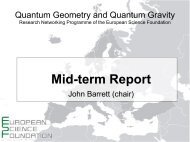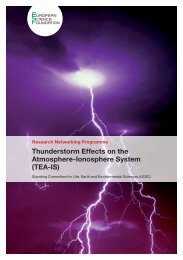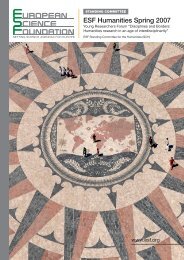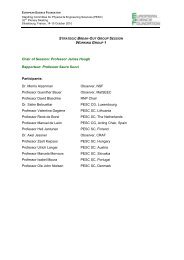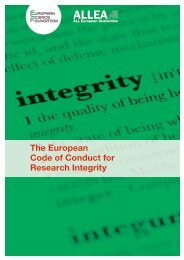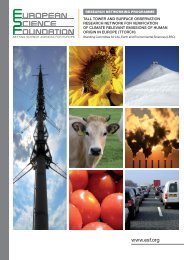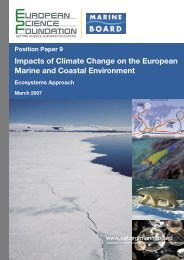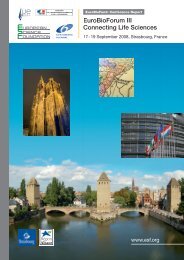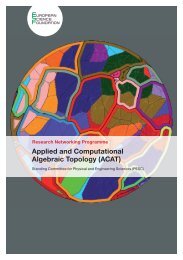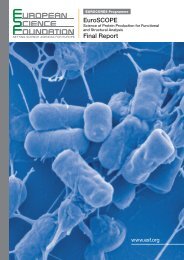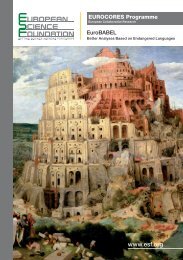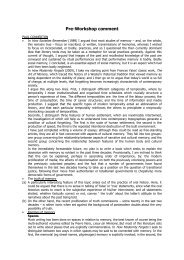European Peer Review Guide - European Science Foundation
European Peer Review Guide - European Science Foundation
European Peer Review Guide - European Science Foundation
Create successful ePaper yourself
Turn your PDF publications into a flip-book with our unique Google optimized e-Paper software.
64<br />
<strong>European</strong> <strong>Peer</strong> <strong>Review</strong> <strong>Guide</strong><br />
ous chapter, and using the results of the survey,<br />
it is recommended to keep the identity of the<br />
reviewers confidential as much as possible. In<br />
some <strong>European</strong> countries, due to constitutional<br />
requirements on openness of the peer review<br />
process, this may not be possible.<br />
• <strong>Review</strong> Panel<br />
– Interdisciplinary proposals: the composition<br />
of the panel should comprise a core group of<br />
experts representing a wide range of disciplines<br />
to ensure the necessary disciplinary expertise in<br />
any given competition, including where possible<br />
individuals who themselves have an interdisciplinary<br />
outlook;<br />
– Proposals per reviewer.<br />
• Reader system<br />
According to the survey, none of the six respondents<br />
for Creation or Enhancement of Scientific Networks<br />
programmes have indicated the usage of reader system.<br />
• Right to reply:<br />
The inclusion of right to reply when applied as part<br />
of the peer review process will add to the robustness<br />
and quality of the selection process and may<br />
be considered whenever feasible. Although, for<br />
programmes for the Creation and Enhancement<br />
of Scientific Networks, none of the six respondents<br />
have indicated its use.<br />
7.2.3 Conflicts of Interest<br />
Networking proposals often bring together large<br />
sections of the available scientific community in<br />
a particular field, and so can present particular<br />
difficulties when it comes to avoiding conflicts of<br />
interest. If the proposal language and thematic<br />
content so permit, it is strongly encouraged to use<br />
international reviewers and panels of experts including<br />
experts from emerging countries.<br />
According to survey results, in response to the<br />
question “How is a possible bias/conflict of interest<br />
identified on the side of the reviewers in this<br />
Instrument?” the following responses are provided<br />
for programmes for the Creation or Enhancement of<br />
Scientific Networks (see table below)<br />
7.2.4 Timeline<br />
Since Networking programmes normally do not<br />
contain funding for research, funding agencies are<br />
encouraged to streamline their procedures as far as<br />
possible to minimise the time to grant.<br />
For programmes for the Creation or Enhancement<br />
of Scientific Networks, the consensus of the six<br />
respondents indicates that their process takes about<br />
10 months with the following breakdown:<br />
• Duration of the call: 1-5 months for 3/6 organisations.<br />
• From proposal submission deadline to funding<br />
decision: 1-5 months for 3/6 respondents.<br />
7.3 Processing of applications<br />
7.3.1 Eligibility criteria<br />
Beside the recommended standard criteria (see<br />
§4.3.1 in Part I of this <strong>Guide</strong>), some additional criteria<br />
should be considered for networking proposals:<br />
• It is good practice to indicate what is expected to<br />
be an optimum range for the number of partners,<br />
while still allowing proposals falling outside of<br />
this range, duly justified;<br />
• in order to maximise viability and in light of the<br />
fact that these grants normally do not include<br />
funding of research, it may be considered to<br />
include criteria that would ascertain the existence<br />
of current and relevant research funding at the<br />
disposal of the participants.<br />
Generally it is recommended that in the case of<br />
calls requiring interdisciplinary and breakthrough<br />
research, the eligibility screening is carried out by<br />
experienced and dedicated administrative staff or<br />
Programmes for the Creation or Enhancement<br />
of Scientific Networks<br />
Checked by the members of staff in the organisation. If<br />
there are conflicts, the potential reviewer is excluded<br />
<strong>Review</strong>ers are asked to check for potential conflicts<br />
themselves and possibly withdraw from the assessment<br />
<strong>Review</strong>ers have to sign a statement confirming that there<br />
are no conflicts of interest<br />
Individual/<br />
Remote reviewers<br />
100.0%<br />
3/3<br />
66.7%<br />
2/3<br />
66.7%<br />
2/3<br />
Panel reviewers<br />
100.0%<br />
3/3<br />
100.0%<br />
3/3<br />
100.0%<br />
3/3



